Whilst London is a city that is proud to play host to some of the most exciting young designers, the capital’s manufacturers are often little heard.
The UK’s manufacturing industry was one of the biggest sectors to be hit when production was taken to Asia and the Far East in the 1990s in a search for cheaper labour.
However, in recent years there has been a resurgence in ‘Made in Britain’ with many brands looking to produce more locally to attract ever more conscious consumers.
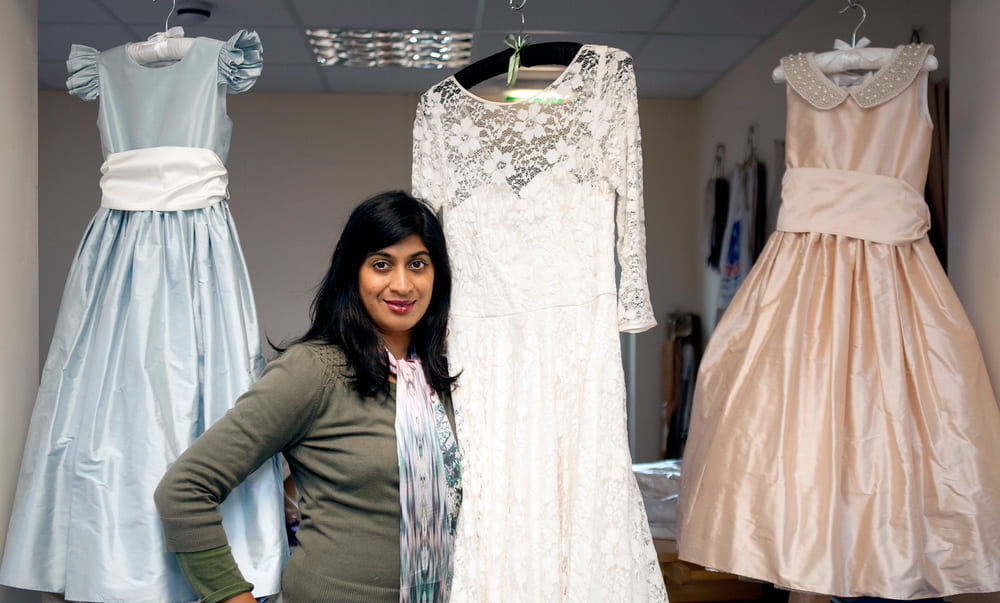
Manufacturing in UK/London not only allows designers to establish a more transparent supply chain, it also gives them more control over the finished product, offers faster, duty free fashion, and reduces shipping costs and carbon footprint.
The realisation of these benefits has brought more opportunities for manufacturers in London, like Fashion Enter, which was set up in 2008 in Haringey with 8 workers, but today produces up to 7,500 garments a week for brands like Asos and M&S.
Next door to Fashion Enter is Albion Knitting Company – set up in 2014 and the first industrial scale flat knitting company founded in London since the Second World War. In the last five years, we have seen high quality manufacturers reappearing in London once again.
One of the manufacturers spearheading this resurgence in Made in Britain is Cut Make and Trim workshop, Threads, established in 2014 by Sital Punja.
I met them one Friday morning, walking past the entrance to the West London ‘factory’ at least three times, checking Google maps and wondering where this big industrial venue was. I ended up spotting ‘Threads London’ written above a doorbell to what looks like a house.
Greeted by warm and welcoming Sital who is a bundle of energy. She ushers me through a series of rooms, until we reach the ‘factory’.
In a slightly cramped but well-organised backroom, four members of staff are busy working on a sampling deadline for Nicki Macfarlane, one of the world’s leading bridesmaid and flower girls designers, responsible for the Duke and Duchess of Cambridge’s wedding. Threads are Macfarlane’s manufacturers and do all of her ready-to-wear.
“We have been working with Nicki Macfarlane for about 6 years now, she’s our primary customer – we built this business with her” Sital explains.
“I was already working with her at the factory I worked at previously (Toumazi and Co), but I decided I wanted to be closer to home, so I set up my own business.”
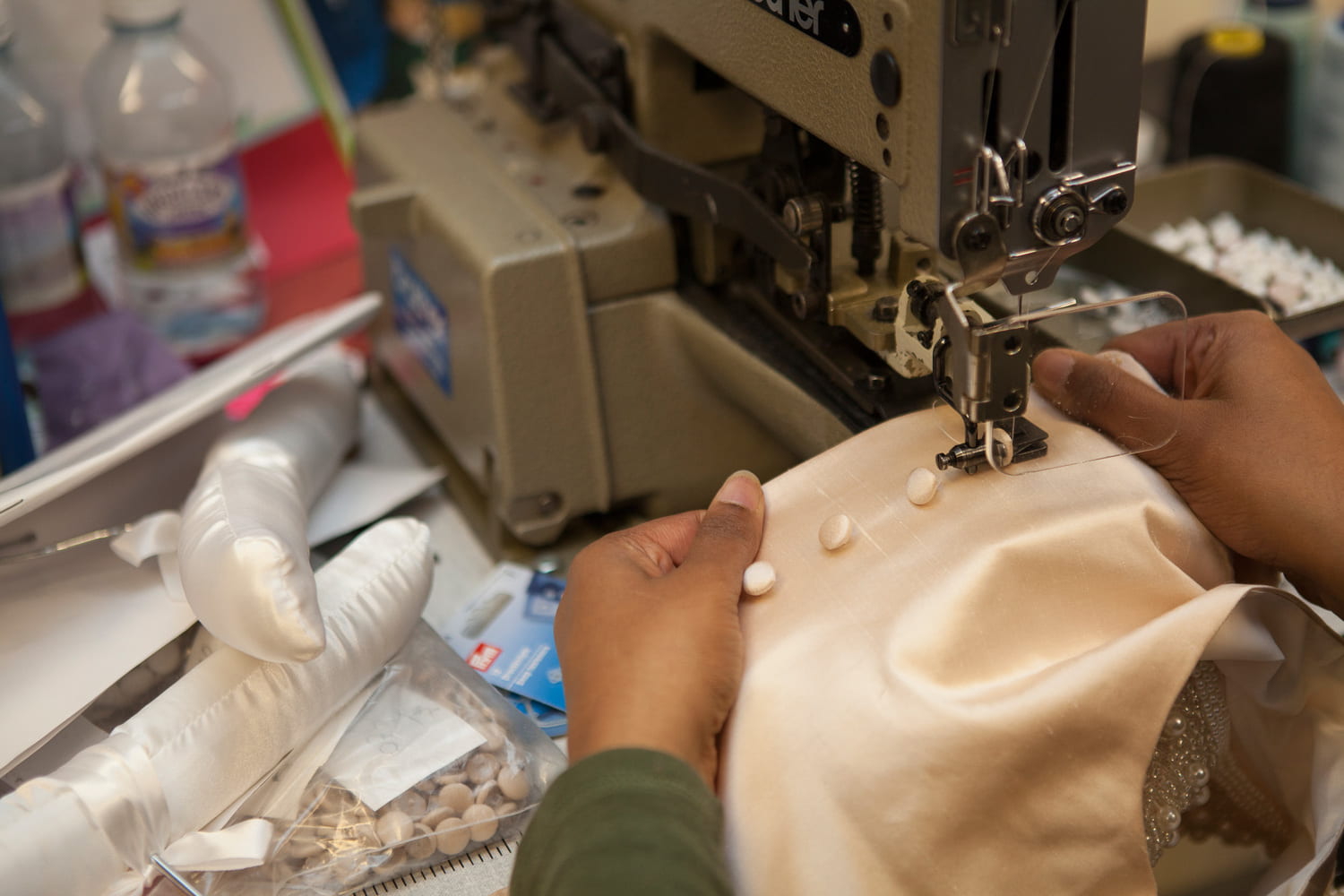
The relationship with Nicki Macfarlane proved a great jumping off point for Threads and Sital has built the business from there. They now work with a strong portfolio of clients including Ted Baker, Lush and Caroline Charles.
Threads mainly work with high end-luxury brands. British manufacturers often can’t compete at the bottom end of the market, because of better regulations and higher minimum wage in the UK, however they can compete on quality – and using a local manufacturer has many advantages.
Sital explains: “We don’t ask for massive quantities because we don’t want them, but we can offer versatility, expertise and good customer service. I think that’s one of the things that the factories of the older generation were not so good at – the collaborative approach. People today need factories to work collaboratively and we can help build brands.”
For a designer, having a local manufacturer means you can make regular visits and quality control more easily. It can also offer peace of mind – being closer to where your product is being made makes you feel more in control of your business.
A lot of young designers want to work more closely with the manufacturer, in fact, as Sital explains, they have to:
“Quite often designers are not taught the manufacturing skills. We have to recognise what our strengths and what our weaknesses are. Surely our opportunity is to say our strength is manufacturing, yours is designing, let us work together to make our product the best it can be.”
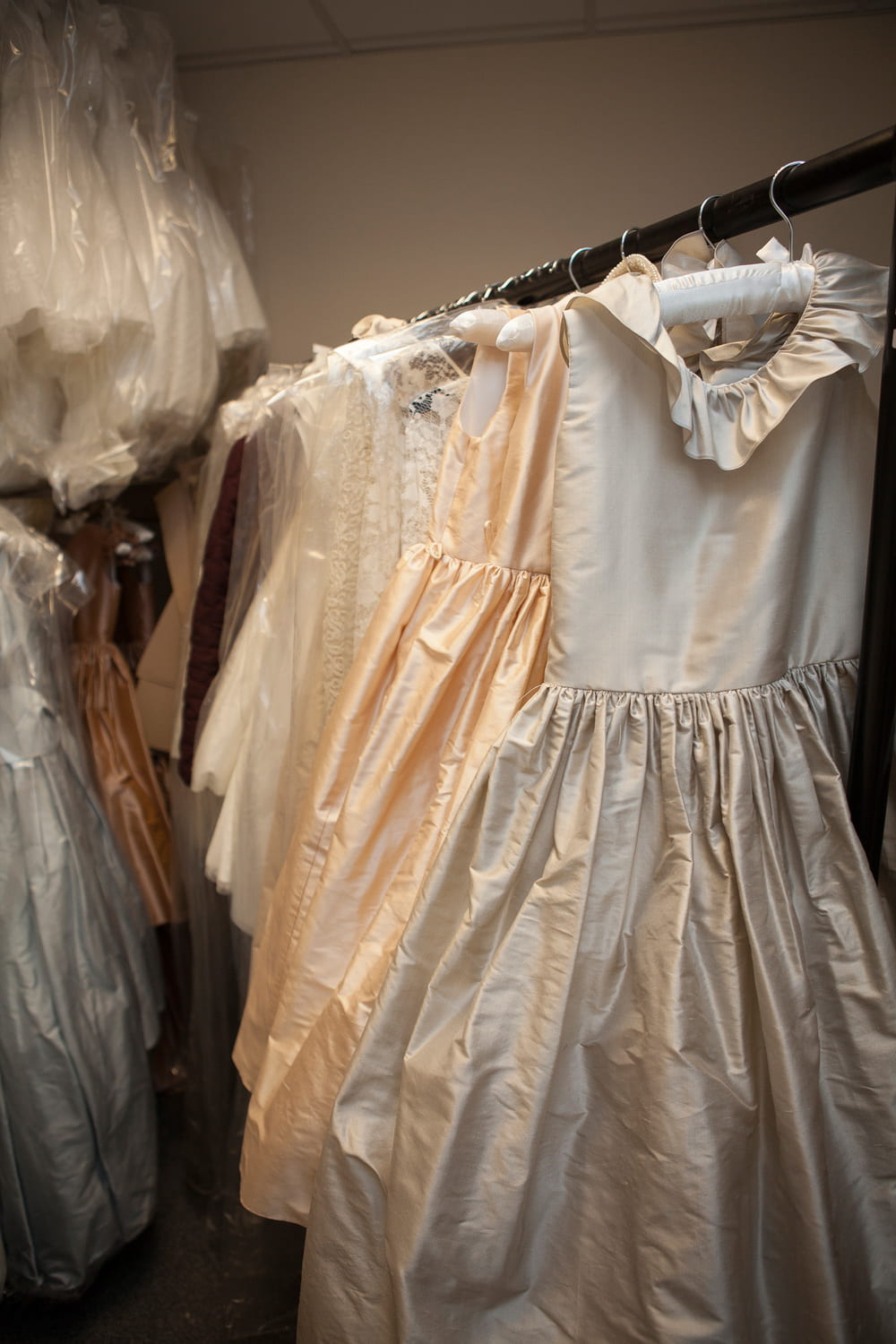
When designers look to set up their own fashion label, their thoughts are largely grounded in aesthetic, shapes, colours and fabrics. The less exciting side of things, the operations and production, can easily be overlooked, but design and manufacture go hand in hand.
“I think sometimes people see manufacturing as something beneath them, but actually if your product is not made well, people are not going to buy it. You’re only as good as your manufacturer.”
Threads do get approached by young designers and have previously worked with palmer//harding. The ‘shirt boys’ have recently risen to prominence, but it was Threads who made the first collection for them back in 2012.
Sital says: “I have lots of designers that come through, but you spot the few where you think ‘you’re going to go far’. I realised that with palmer//harding. I liked what they were doing, their approach was really interesting.”
Cleary Sital has an eye for a designer, but surprisingly her background is in sales and marketing. It was only after discovering a gap in the manufacturing industry, that Sital began doing consultancy work for clothing factories.
“I come from a completely business background, but I decided to retrain as a cloth cutter and it was this training that helped me set Threads up. I started to work more on the production floor and I thought well if I can do this, I am going to do it for myself.”
Sital previously ran the award winning social enterprise Sari UK, which worked to create couture dresses and ball gowns out of old saris in order to raise money for children’s charities. She is passionate about using business as a force for good, and this is reflected in the principles of Threads.
They offer equal pay – regardless of sex. They are clear on their rejection of illegal labour, which Sital explains is unfortunately still very much present, even in London. They recycle as much as they can, giving most of their leftover fabric to a place in Northwood Hills called WRAP who donate it to local schools, all the sewing machines are low energy and the tables they sit on are made from FSC wood.
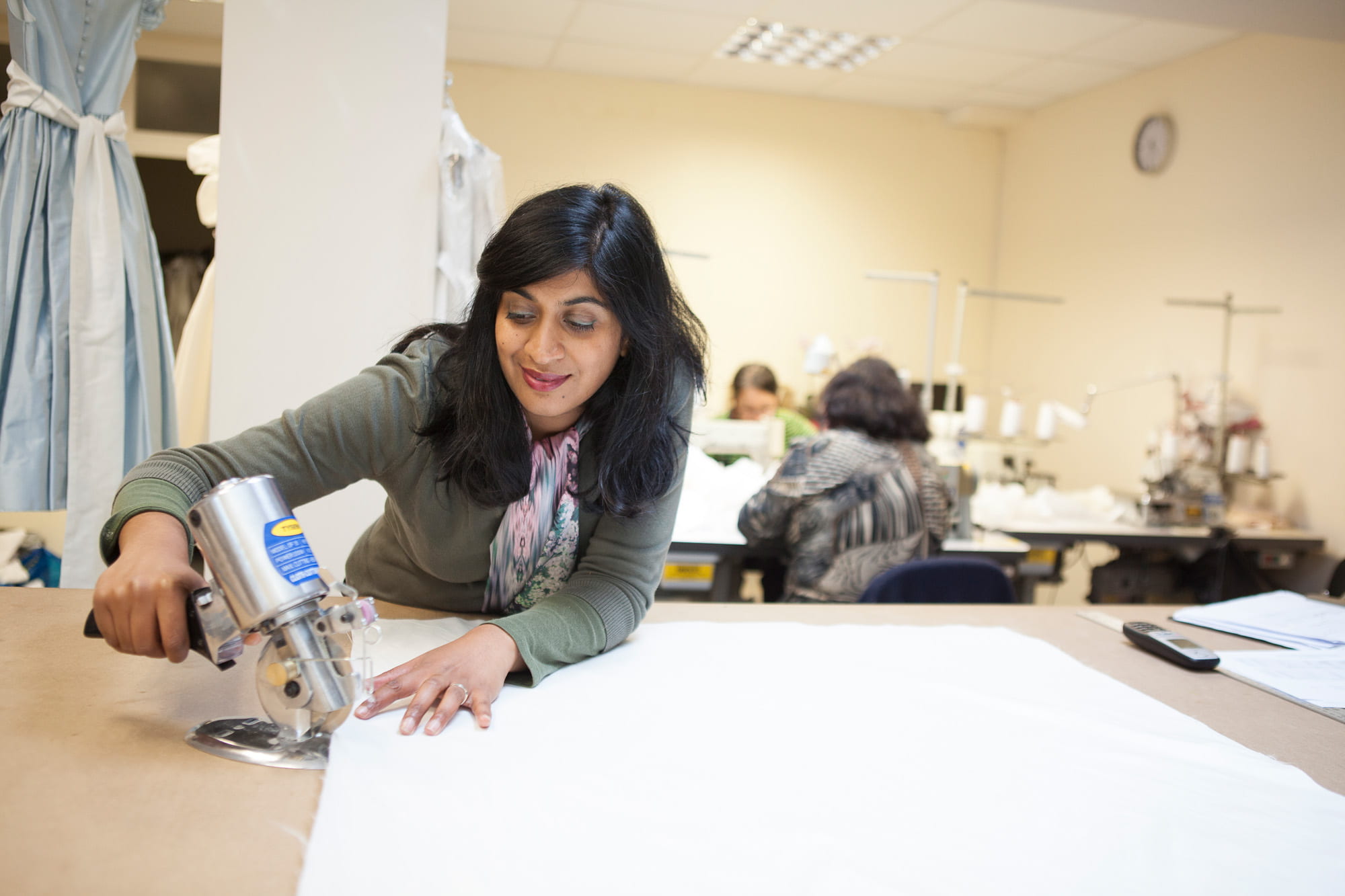
There is a real attention to detail across the business, and this is also clear in Thread’s website. Many manufacturers’ website look static and uninviting, but Thread’s is modern with smart photography and clear explanations of the services they offer.
Sital confirms: “A website sets a standard of what kind of factory you are. We want to give designers the confidence to approach us and ensure that they know we are a company you can trust.”
She is keen to set Threads apart from the sweatshops, which she knows exist in London. I am interested to know if Sital finds the capital a good place to be a manufacturer.
“I think it’s an exciting place to be, but also not an easy one. Running a business in London is really costly, finding premises that haven’t been converted into flats is so difficult. There are so many empty properties in London but they are all owned by private landlords.
“We’re lucky here because we’re just opposite a tube station (Ruislip Manor), so its easy access but a lot of factory premises are on industrial estates in the middle of nowhere – which is unsafe for people to come to work.”
“Now the government are going to put the rates up, which is going to put a noose around our necks, you do begin to wonder ifs it worth it?”
Sital believes the fashion industry – worth £28 billion to the UK economy – should receive more support from the government.
“Rather than just concentrating on certain services, this is a huge industry which adds significant revenue to the country, why not help us out by allowing us to update our machinery, so we can work faster and achieve more, being more cost-effective and offer better prices?”
The lack of government support has surely impacted on society’s view of manufacturing as design’s ugly sister. This stereotype needs to change if we are to truly make London a fashion powerhouse.
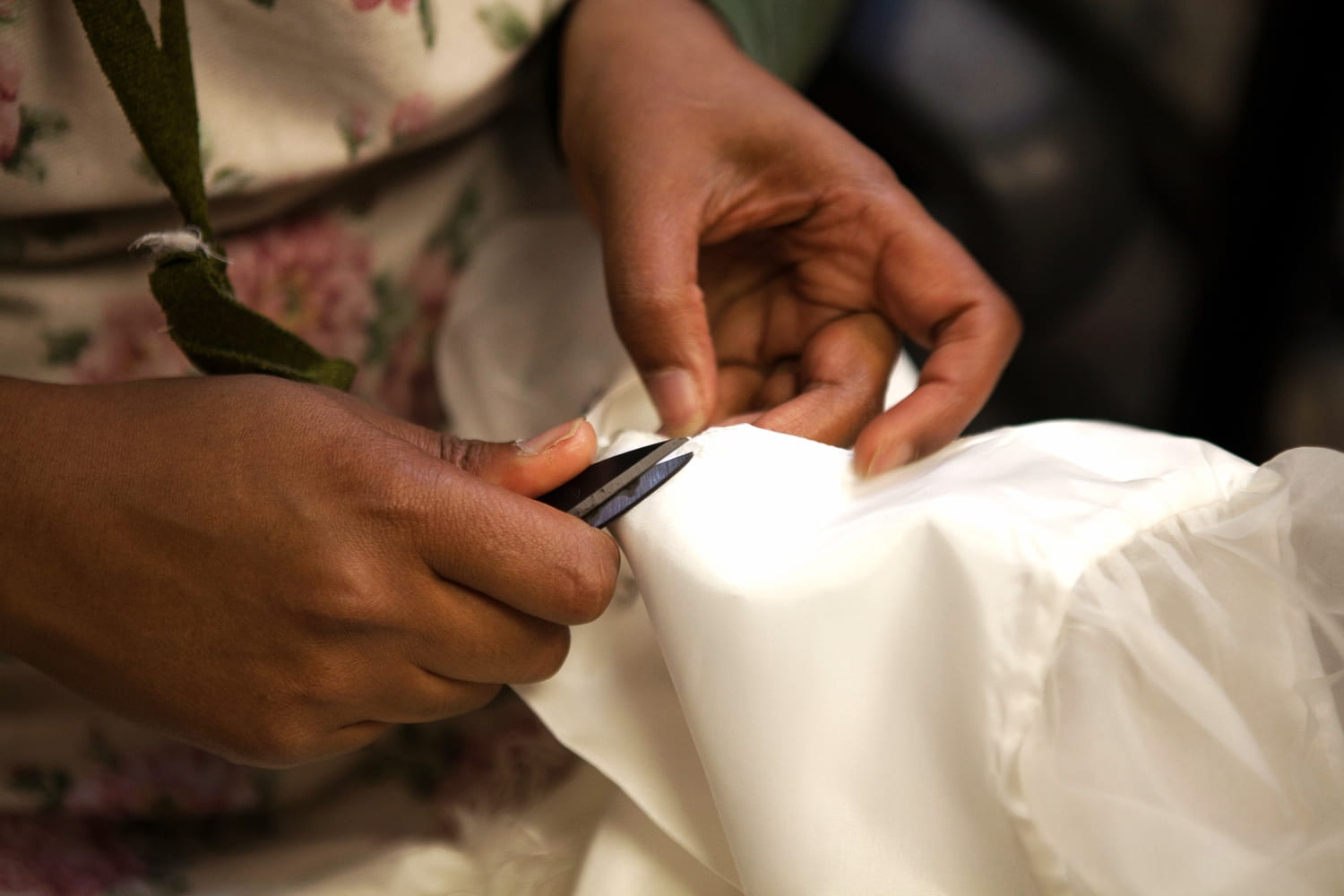
Threads is proof that London does have world class manufacturers. Now we need to change the stereotype. We need to create opportunities for young people to get involved in manufacturing through education.
Organising trips for secondary school students to local factories would send the message that fashion isn’t just about designing or styling, but that you can have a creative and fulfilling career in manufacturing too.
At London College of Fashion we are one of the very few institutions to offer courses in things like management and pattern cutting, but perhaps there could also be more apprenticeships available to get into sourcing, machining and production.
But firstly, we need to start celebrating the brilliant work our manufacturers are doing in London right now. Perhaps if more girls (and boys) could see successful, female business owners like Sital, they would be inspired to pursue a career in manufacturing too.
London is a fast becoming an internationally recognised hotspot for design. But this is only one part of the fashion industry and only one potential career path. With some promotion and investment in skills, we may not return to the ‘glory days’ pre-1990s, but may well be on the way to rebuilding manufacturing communities, strengthening the economy and establishing London as a fashion force to be reckoned with.




